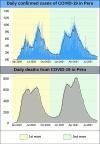Justice implications of health and food security policies for Indigenous peoples facing COVID-19: a qualitative study and policy analysis in Peru
- PMID: 37995268
- PMCID: PMC10680992
- DOI: 10.1093/heapol/czad051
Justice implications of health and food security policies for Indigenous peoples facing COVID-19: a qualitative study and policy analysis in Peru
Erratum in
-
Correction to: Justice implications of health and food security policies for Indigenous peoples facing COVID-19: a qualitative study and policy analysis in Peru.Health Policy Plan. 2024 Apr 10;39(4):445. doi: 10.1093/heapol/czae014. Health Policy Plan. 2024. PMID: 38451200 Free PMC article. No abstract available.
Abstract
The spread of COVID-19 in Peru resulted in the declaration of a national health emergency, in which Indigenous peoples were identified as being particularly vulnerable due to their pre-existing poor health indicators and disadvantaged social conditions. The aim of this paper is to examine how the Peruvian government responded to the health and food needs of the Shawi and Ashaninka Indigenous peoples of Peru during the first 18 months of the pandemic (March 2020-August 2021). This study uses both official policy documents and real-world experiences to evaluate policy responses in terms of their immediate impact and their longer-term sustainability and contribution to the improvement of health, well-being and justice for Indigenous communities. Four health and food security responses were evaluated: the Amazon Health Plan and Indigenous Command; food aid; cash aid; and COVID-19 vaccination. We employed the Multidimensional Injustice Framework to analyse the justice implications of the design and implementation of responses. Data collection included 71 interviews with government officials (n = 7), Indigenous leaders (n = 31) and community members (n = 33). The results show how national and regional governments released policies to address the health and food needs of Indigenous peoples directly or indirectly, as part of a broader focus on vulnerable people. However, justice implications were not sufficiently addressed in the design or implementation of the responses. On the distributive dimension, Indigenous communities were prioritized to receive health goods and services, nevertheless, the distribution had shortcomings that impeded their collection and Indigenous food systems and livelihoods were largely overlooked. On the procedural dimension, Indigenous representatives were included to provide culturally sensitive feedback on health interventions, but without funding, and furthermore, the community members had only passive participation. This paper points out the importance of considering and addressing justice implications for more effective and fairer health and food policy responses to current and future health crises.
Keywords: COVID-19; Indigenous; food; health; justice.
© The Author(s) 2023. Published by Oxford University Press in association with The London School of Hygiene and Tropical Medicine.
Conflict of interest statement
We have no conflicts of interest to declare.
Figures




Similar articles
-
Exploring the Implications of COVID-19 on Food Security and Coping Strategies among Urban Indigenous Peoples in Saskatchewan, Canada.Nutrients. 2023 Oct 7;15(19):4278. doi: 10.3390/nu15194278. Nutrients. 2023. PMID: 37836563 Free PMC article.
-
Correction to: Justice implications of health and food security policies for Indigenous peoples facing COVID-19: a qualitative study and policy analysis in Peru.Health Policy Plan. 2024 Apr 10;39(4):445. doi: 10.1093/heapol/czae014. Health Policy Plan. 2024. PMID: 38451200 Free PMC article. No abstract available.
-
Effects of food policy actions on Indigenous Peoples' nutrition-related outcomes: a systematic review.BMJ Glob Health. 2020 Aug;5(8):e002442. doi: 10.1136/bmjgh-2020-002442. BMJ Glob Health. 2020. PMID: 32816952 Free PMC article.
-
Ensuring the right to food for indigenous children: a case study of stakeholder perspectives on policy options to ensure the rights of tamariki Māori to healthy food.Int J Equity Health. 2021 Feb 27;20(1):67. doi: 10.1186/s12939-021-01407-4. Int J Equity Health. 2021. PMID: 33639956 Free PMC article.
-
Food system sustainability for health and well-being of Indigenous Peoples.Public Health Nutr. 2015 Sep;18(13):2415-24. doi: 10.1017/S1368980014002961. Epub 2014 Dec 19. Public Health Nutr. 2015. PMID: 25522932 Free PMC article. Review.
Cited by
-
COVID-19 ethics: unique aspects and a review as of early 2024.Monash Bioeth Rev. 2024 Jun;42(1):55-86. doi: 10.1007/s40592-024-00199-x. Epub 2024 Jul 13. Monash Bioeth Rev. 2024. PMID: 39003388 Free PMC article. Review.
References
-
- Aldcroft A, Branch-Hollis A, Phillips T, Sands R. 2023. Editorial: BMJ Public Health: a new public health journal from BMJ. BMJ Public Health 1: e000008.
-
- Ali T, Paton D, Buergelt PT et al. 2021. Integrating Indigenous perspectives and community-based disaster risk reduction: a pathway for sustainable Indigenous development in Northern Pakistan. International Journal of Disaster Risk Reduction 59: 102263.
-
- Arotoma-Rojas I, Berrang-Ford L, Zavaleta-Cortijo C, Ford JD, Cooke P. 2022. Indigenous peoples’ perceptions of their food system in the context of climate change: a case study of Shawi men in the Peruvian Amazon. Sustainability 14: 16502.
-
- Bacud S. 2017. Integration of Indigenous and scientific knowledge in disaster risk reduction: resilience building of a marginalized sampaguita growing community in the Philippines. Procedia Engineering 212: 27–9. 10.1016/j.proeng.2018.01.066 - DOI

